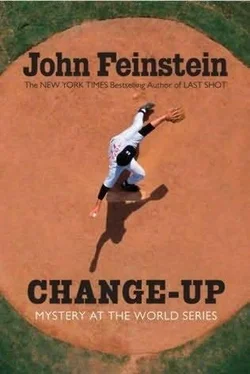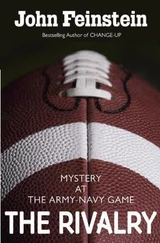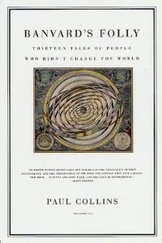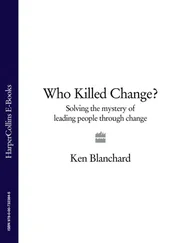11: NORBERT DOYLE, SUPERSTAR
STEVIE STOOD UP A MOMENT LATER and thanked Nieves. Someone was walking around the room saying it would close to the media in five minutes. When they shook hands, Nieves said, “I probably said too much. I hope you handle that gently with Norbert. I know it has to be upsetting for him to even think about it.”
“We talked about it a little yesterday, and he did get choked up,” Stevie said, telling the truth. “It’s probably nothing. He probably feels guilty because they were in the wrong place at the wrong time that night.”
Nieves nodded. “I guess so. Or he somehow thinks he should have been able to avoid the accident. He never brought it up again and neither did I. I’m so happy for the guy right now. I wouldn’t want to see anything take away from this.”
“Me neither,” Stevie said. “Don’t worry about it.”
Stevie felt a little guilty. Nieves had been remark ably honest, and now he clearly felt as if he had violated the confidence of a teammate. But Stevie knew he had to follow up on what Nieves had told him-even if he wasn’t sure what it was he was following up on. He knew it was personal-extremely personal. So, was it really news?
He walked back across the room looking for Kelleher but didn’t see him. He remembered Kelleher saying he wanted to talk to the Red Sox, so maybe he was in their clubhouse.
“How’d you do with Wil?” Aaron Boone said when he passed him on his way out.
“Great,” Stevie said.
Boone nodded. “If I was a reporter, I’d love this clubhouse,” he said. “Most of our guys haven’t been around long enough to become jaded about all this.”
“You’ve been around a long time,” Stevie said.
“Oh yeah-I’m old,” Boone said, laughing. “But I’m not good enough to be jaded.”
Stevie knew that wasn’t true. Boone was famous for his home run in the eleventh inning of game seven of the ALCS in 2003 that had allowed the Yankees to beat the Red Sox and advance to the World Series. He was still known in Boston as “Aaron Bleepin’ Boone” because of it, and many of the pre-Series stories had been about his return to Boston six Octobers later.
“You’re being modest,” Stevie said.
“Yeah, you’re right,” Boone said, laughing again.
Stevie was tempted to ask Boone what his read of Norbert Doyle was. Clearly, he was a smart guy with a good sense of humor. But time was up in the clubhouse, and this wasn’t the right time anyway. So he waved goodbye and headed down the hallway to see if Kelleher was in the Red Sox clubhouse. He found him among a group of reporters around David Ortiz. When Stevie walked up, Ortiz was talking about the triple play.
“Someone called me this morning to tell me I’d made history,” he said, smiling. “First triple play in the World Series in eighty-nine years. I can tell my grandkids about it someday. It’s what I’ll be known for.”
Everyone laughed. Someone asked Ortiz if he’d ever heard of Bill Wambsganss. “Not until last night,” he said. “Now I even know how to spell his name.”
“I’m glad we came,” Kelleher said, walking away while Ortiz continued to talk. “I picked up some stuff that will help my column a lot. How’d you do with Nieves?”
“So well I’m not even sure what I’ve got,” Stevie said.
Kelleher gave him a look. “I should have known,” he said. “Only you can take a story that appears to be The Rookie on steroids and find something hiding underneath. Let’s go outside and you can tell me about it.”
They walked back into the hallway, and Kelleher leaned against the wall while Stevie read back to him what Nieves had said.
“Whoo boy,” Kelleher said.
“Isn’t it possible he just feels guilty because he lived and she didn’t?” Stevie asked.
“Of course-likely, even,” Kelleher said. “But it feels like more than that, doesn’t it?” He paused. “It may be time for us to ask Susan Carol about her talk with David yesterday in Boston. Before we go running around on what might be a wild-goose chase, let’s find out what she knows about the goose.”
“I don’t think she’ll tell us,” Stevie said.
“Maybe not,” Kelleher said. “But we’ll ask anyway.”
“And if that doesn’t work?”
“One of us may be going on a road trip,” Kelleher said.
“Road trip?” Stevie said. “Where to?”
“To Lynchburg, Virginia,” Kelleher said. “And into Doyle’s past.”
On the car ride home Stevie asked Kelleher what the purpose of going to Lynchburg would be.
“You know Bob Woodward, right? The Bob Woodward, as in Watergate and Richard Nixon?”
Stevie nodded.
“He was my editor when I was starting out on the Metro staff at the Post . He was the best reporter I’ve ever met. He had a saying about stories that don’t seem to add up: ‘Get the documents.’”
“What does that mean?” Stevie asked.
“It means that somewhere, someplace, there is paperwork on almost everything that happens in the world. The story that really got Watergate going came when he and Carl Bernstein ran down some obscure bank records. They found a check that linked the burglary at the Watergate to Nixon’s reelection committee. And, at the end, the final documents were the tapes from the White House that proved Nixon had discussed covering up the break-in right after it happened. Any time we were stalled on a story, Bob would say, ‘There have to be documents, there always are.’”
“So, what kind of documents would there be on this story?”
“Court records,” Kelleher said. “Or police records. Somewhere in Lynchburg there has to be paperwork on what happened the night Analise Doyle was killed.”
“But what can it possibly tell us that we don’t already know?” Stevie said. “She was killed by a drunk driver. What more can there be to that?”
“I have no idea,” Kelleher said. “But if we think there’s more to Doyle’s story, the night she died is the place to start. And if Woodward’s theory is correct-and it always is-the documents should at least give us a direction to look next.”
“So you’re going to go to Lynchburg, Virginia, in the middle of the World Series?”
“First we’re going to talk to Susan Carol,” Kelleher said. “But if that’s a nonstarter, I’m not going to Lynchburg, you are.”
“Me?” Stevie said.
“Yes, you,” Kelleher said. “If Susan Carol can’t or won’t tell us what this is all about, you’re going to take a train down there tomorrow.”
“What about the game?” Stevie asked, dismayed.
“This is potentially a lot more important than writing a sidebar off game three. You can be there in only about four hours or so on the train.”
“And what am I going to do when I get there?” Stevie asked.
“You’re going to take a cab to the courthouse, and you’re going to ask for the police records from the accident. When was it-1997? It shouldn’t take them that long to find it.”
“It was in August of that year,” Stevie said, remembering what Doyle had said back in Boston.
“I doubt if there will be too many police reports under the name Analise Doyle,” Kelleher said. “You’ll be able to find it.”
“And they’ll give it to me?” Stevie asked.
“Public records,” Kelleher said. “You would be amazed how many things are in the public record. All police reports are unless they’re sealed by a court for some reason.”
Stevie was less than thrilled by the idea of a four-hour train ride and a trip to a courthouse in a strange town. He had a feeling his parents wouldn’t be thrilled at the idea either. But if Kelleher thought it was important, he wasn’t going to say no.
Читать дальше












